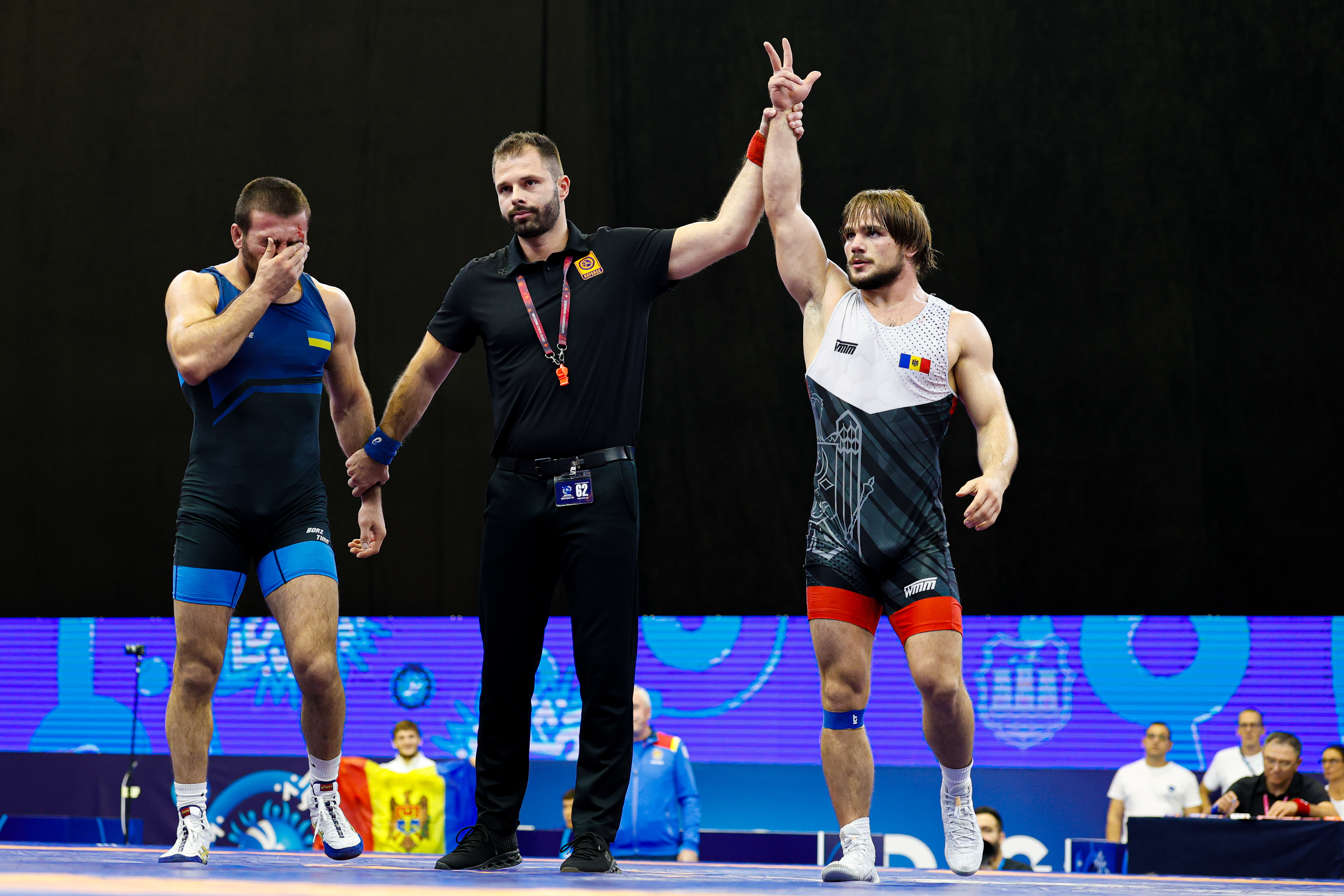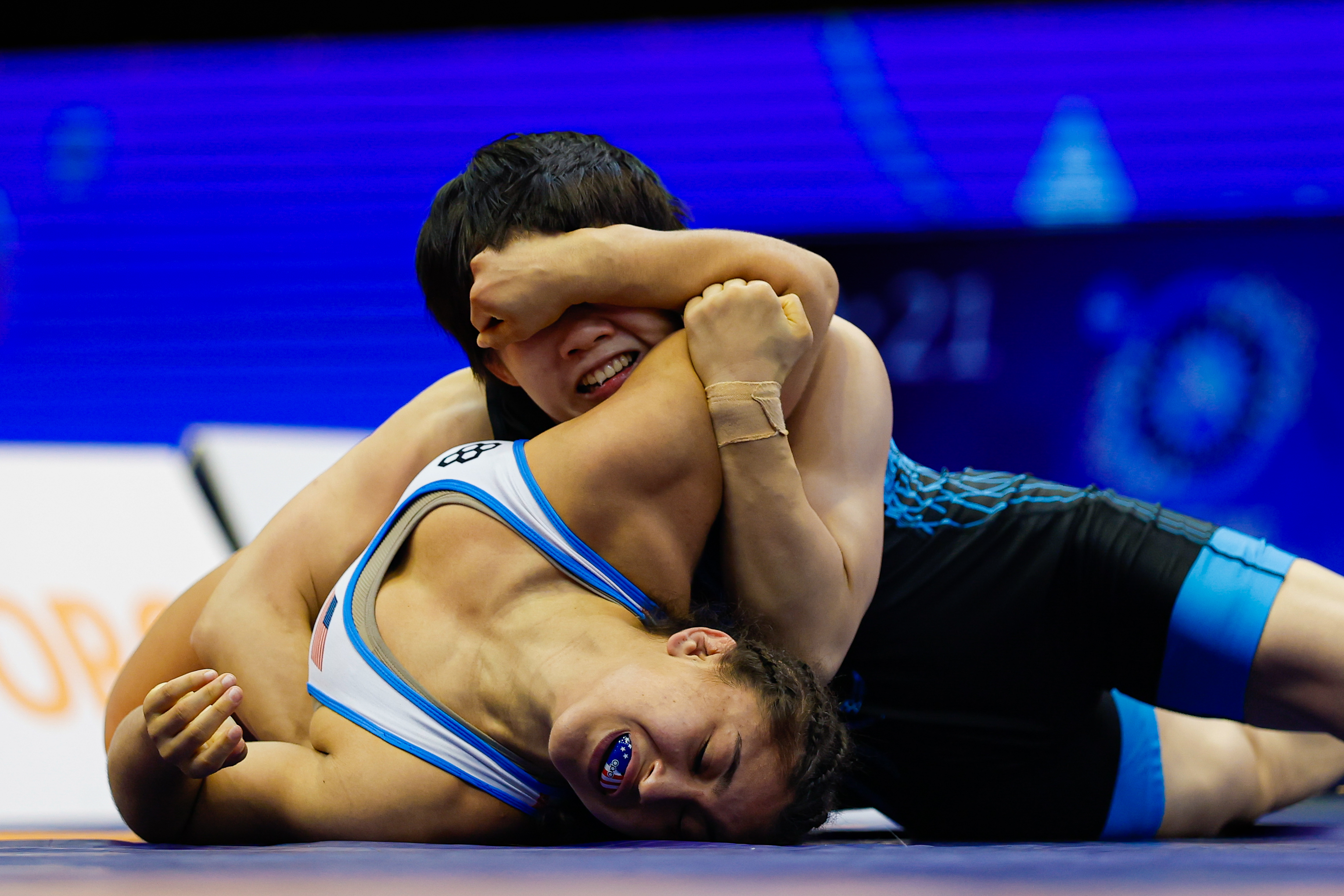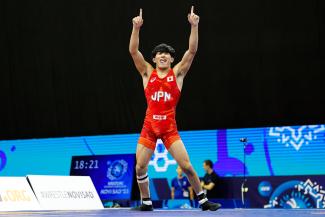NOVI SAD, Serbia (October 23) -- Japan had been searching for a Greco-Roman gold medalist at the U23 World Championships for six years. Shota OGAWA (JPN) won the country's last gold at this tournament in 2019, while Komei SAWADA (JPN) reached the final last year.
The wait ended on Thursday in Novi Sad after Koto GOMI (JPN) clinched the gold medal at 60kg with a technical superiority win over Sajjad ABBASPOUR (IRI) in the final.
Gomi, a product of the Ikuei University, became only the fifth Greco U23 world champion for Japan but none of the earlier four champions dominated the field as he did. He opened his tournament with a 10-2 win over former U20 world champion Suren AGHAJANYAN (ARM), defeated Melkamu FETENE (ISR), 13-4, before winning his semifinals 9-0 against Maxwell BLACK (USA).
Facing Abbaspour in the final, Gomi made sure he won his fourth bout with technical superiority as well. He got the first point when Abbaspour was put in par terre. Soon after, Gomi turned Abbaspour for two more points before adding a throw which got him one point and a 4-0 lead.
When the second period began, Abbaspour tried to get Gomi in par terre with some aggressive wrestling. He managed to body lock Gomi, but as he tried to force the Japanese towards the mat, Gomi tossed him using the momentum for four points to clinch the victory. Iran challenged the call only to lose it and add one more point to Gomi's score.
Despite the loss of Abbaspour, Iran won the Greco team title, completing a sweep of all world team titles in Greco this year. It won the U17 in Athens, U20 in Samokov, senior in Zagreb and the U23 in Novi Sad.
 Alexandrin GUTU (MDA) won the 82kg final in Novi Sad. (Photo: United World Wrestling / Kostadin Andonov)
Alexandrin GUTU (MDA) won the 82kg final in Novi Sad. (Photo: United World Wrestling / Kostadin Andonov)
At 82kg, Alexandrin GUTU (MDA) won a gold medal for a third straight year. While his first two gold medals came at 77kg, he moved up to 82kg this year but still managed to win the world title.
Gutu, known for his big throws, had to be satisfied with a 1-1 victory against Ruslan ABDIIEV (UKR) in the final. He got the first par terre point to lead 1-0. In the second period, Gutu was put in par terre twice but defended both times to win the gold medal.
Mixed show for U.S.
In women's wrestling, the United States had three wrestlers in the finals of three weight classes but it managed to win only one gold. China and Kyrgyzstan denied the U.S. in the other two finals.
One of the best matches of the night came at 72kg between former U20 world champion Jasmine ROBINSON (USA) and senior world bronze medalist Nurzat NURTAEVA (KGZ).
Robinson was off to a blazing start in the final, leading 10-3, but she tried two risky throws that cost her the match. The first was a chestwrap which was blocked by Nurtaeva who managed to bring Robinson to danger. It was initially scored four points for Robinson and two for Nurtaeva but Kyrgyzstan challenged the call and it was awarded four points to the Kyrgyzstan wrestler.
With a 10-7 lead, Robinson once again attempted a double underhook throw which was easily defended by Nurtaeva who managed to land on top of the U.S. wrestler and get another four points. She defended her 11-10 lead to become the country's second U23 world champion in Women's Wrestling and first since 2021.
 Jinyue LIANG (CHN) tries to pin Audrey JIMENEZ (USA) in the 50kg final. (Photo: United World Wrestling / Kostadin Andonov)
Jinyue LIANG (CHN) tries to pin Audrey JIMENEZ (USA) in the 50kg final. (Photo: United World Wrestling / Kostadin Andonov)
The second loss for the U.S. came at 50kg, as Audrey JIMENEZ (USA) was once again defeated in a World Championships final, her fifth defeat.
She began her final well against Jinyue LIANG (CHN), taking a 2-0 lead. But the China wrestler bounced back and made it 2-2 when Jimenez missed a sweep single and Liang scored a go-behind to lead.
Liang then pulled off a crafty move to put Jimenez in danger. Both wrestlers were locked in double underhooks with knees on the mat. Liang then pulled one of Jimenez's arms and put her hand on the knee across to trip her and hold her on the mat, trying to get a fall.
Jimenez committed a defensive foul by putting her fingers on Liang's face which costed her two more points. She survived the pin attempt but trailed 6-2 at the break. There were no points scored in the second period as Liang went into defensive mode and did not give Jimenez any openings.
This was China's first gold medal in Women's Wrestling at U23 Worlds in six years as Liang became only the third wrestler to win gold at this level. Earlier, two wrestlers had won three golds for China with PAHILA (CHN) winning golds in 2017 and 2018.
The U.S. did crown a champion on Thursday as 72kg champion Kylie WELKER (USA) won gold at 76kg in dominant fashion. She controlled an evasive Valeriia TRIFONOVA (UWW) and finished the final 10-0 inside the first period.
RESULTS
Greco-Roman
60kg
GOLD: Koto GOMI (JPN) df. Sajjad ABBASPOUR (IRI), 9-0
BRONZE: Mehroj BAKHRAMOV (UZB) df. Ilkin GURBANOV (AZE), 5-4
BRONZE: Suren AGHAJANYAN (ARM) df. Maxwell BLACK (USA), 8-0
82kg
GOLD: Alexandrin GUTU (MDA) df. Ruslan ABDIIEV (UKR), 1-1
BRONZE: Abolfazl MOHMEDI (IRI) df. Data CHKHAIDZE (GEO)
BRONZE: Omar SATAYEV (KAZ) df. Ibrahim TABAEV (BEL), 8-6
Women's Wrestling
50kg
GOLD: Jinyue LIANG (CHN) df. Audrey JIMENEZ (USA), 6-2
BRONZE: Munkhgerel MUNKHBAT (MGL) df. Natalia PUDOVA (UWW), 5-4
BRONZE: Aida KERYMOVA (UKR) df. Nohalis LOYO JIMENEZ (VEN), 9-7
72kg
GOLD: Nurzat NURTAEVA (KGZ) df. Jasmine ROBINSON (USA), 11-10
BRONZE: Mahiro YOSHITAKE (JPN) df. Laura KOEHLER (GER), 8-0 (via fall)
BRONZE: Veronika VILK (CRO) df. Haticenur SARI (TUR), 8-0
76kg
GOLD: Kylie WELKER (USA) df. Valeriia TRIFONOVA (UWW), 10-0
BRONZE: PRIYA (IND) df. Edna JIMENEZ VILLALBA (MEX), 8-1
BRONZE: Elmira YASIN (TUR) df. Kaiyrkul SHARSHEBAEVA (KGZ), 6-3
Semifinals
55kg
GOLD: Shugyla OMIRBEK (KAZ) vs. Tuba DEMIR (TUR)
SF 1: Shugyla OMIRBEK (KAZ) df. Amory ANDRICH (GER), via fall
SF 2: Tuba DEMIR (TUR) df. NISHU (IND), 6-4
57kg
GOLD: Akari FUJINAMI (JPN) vs. Aryna DZEMCHANKA MARTYNAVA (UWW)
SF 1: Akari FUJINAMI (JPN) df. Roza SZENTTAMASI (HUN), 10-0
SF 2: Aryna DZEMCHANKA MARTYNAVA (UWW) df. Emine CAKMAK (TUR), via fall
65kg
GOLD: Yuqi RAO (CHN) vs. Elizaveta PETLIAKOVA (UWW)
SF 1: Yuqi RAO (CHN) df. Oleksandra RYBAK (UKR), 6-5
SF 2: Elizaveta PETLIAKOVA (UWW) df. PULKIT (IND), 9-6
68kg
GOLD: Alina SHEVCHENKO (UWW) vs. Nesrin BAS (TUR)
SF 1: Alina SHEVCHENKO (UWW) df. SRISHTI (IND), 10-6
SF 2: Nesrin BAS (TUR) df. Gulnura TASHTANBEKOVA (KGZ), 8-6



 Alexandrin GUTU (MDA) won the 82kg final in Novi Sad. (Photo: United World Wrestling / Kostadin Andonov)
Alexandrin GUTU (MDA) won the 82kg final in Novi Sad. (Photo: United World Wrestling / Kostadin Andonov) Jinyue LIANG (CHN) tries to pin Audrey JIMENEZ (USA) in the 50kg final. (Photo: United World Wrestling / Kostadin Andonov)
Jinyue LIANG (CHN) tries to pin Audrey JIMENEZ (USA) in the 50kg final. (Photo: United World Wrestling / Kostadin Andonov)
Share your thoughts.
Comments